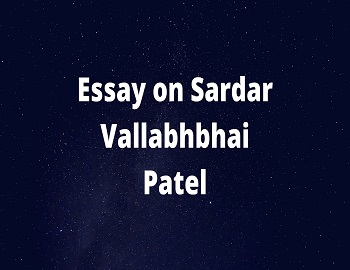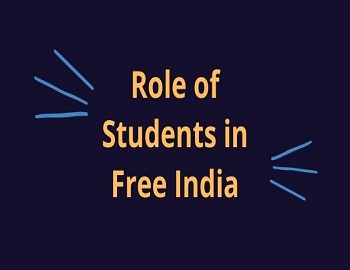Sardar Vallabhbhai Patel:
Men’s minds thought of Patel, when there were riots to protest against S.R.C. Report or when the Goa problem worried us. That strong man would have finished such a problem in no time. He was the greatest administrator and the best statesman that India has produced.
Patel was the Bismark of India, the Chanakya of modern times. What Nehru is for foreign affairs, Patel was for internal administration. A born administrator, an unrivalled politician, he knew no weakness. He was India’s strong man with an iron will. Tough and rugged, he was India’s man of destiny, the uncompromising opponent of the old order and the brightest luminary on the home-front. He was a terror to the Communists, despair of the Socialists and a tower of strength to the country and the Congress. At 75, he had a young heart in an old body, he was a walking volcano with fires raging in his heart. India is a land of dreamers and idealists, people who live in the ivory tower of philosophy, hidden in the light of thought. He was the greatest man of action, an Indian Napoleon. He believed not in idle words but in practical action.
Patel was not a man to be trifled with, to be bullied or to be bluffed. He had a clear vision of things and planned his moves with an eye on practical possibilities. When he made up his mind, he marched to his goal smashing all obstacles in the way. Defeat he never knew, a weakness he never felt; indiscipline he never tolerated. Shakespeare said of Julius Caesar:
“When Caesar says, ‘Do this,’ it is performed”.
So we may say when Patel wanted a thing to be done, it’s done. When the British talked of postponing the date of the opening session of the Indian Constituent Assembly, Patel thundered, “Even if the heavens fall or earth splits, the Constituent Assembly shall meet on the due date”. Obstacles as high as the Himalayas failed to disturb his plans. When the Nizam of Hyderbad was flirting with Pakistan and was oppressing the masses, Sardar Patel gave the warning publicly, “If the Nizam does not heed the writing on the wall, Hyderabad will go to the Junagadh way”. The indomitable Sardar was as good as his word, and Hyderabad lay fallen and vanquished at the feet of Patel.
Future historians will marvel at the organizing capacity and superhuman ability of Patel. The integration of 560 princely states and the elimination of the autocratic rule of the Maharajas and Nawabs will stand out as his greatest achievement in the centuries to come. When the British left, there were some 600 states in India. Some of these, like Hyderabad, were as big as France, some were as small as a district, or even smaller. When the British Power withdrew on August 15, 1947, these states were absolutely free, either to join India or to accede to Pakistan or to remain independent. Some of these petty Rajahs and Nawabs dreamed of becoming independent, while some Muslim Nawabs ruling over Hindu states dreamed of acceding to Pakistan. This would have created hundreds of Pakistans in the heart of India. Hyderabad dreamed of remaining independent. In that case, it would serve as a base for foreign countries and a springboard for an attack on India. Besides, there could be no real independence for India, if one-third of her population inhabiting the princely states continued to be crushed, as during the past centuries, under the iron heel of the tyranny of their Nawabs and Rajas. There was a one-man rule in those states. Patel saw that the existence of such citadels of reaction and autocracy in the heart of India and in the middle of the twentieth century was a grave danger to India and these might become centres of rebellion.
Meanwhile, Pakistan continued to intrigue with the Muslim rulers of Indian states. Junagadh, a small state in Gujarat-Kathiawar, was a Hindu-majority state, though the Nawab was a Muslim. The Nawab announced the accession of the state to Pakistan in defiance of the wishes of the people. Not only that, two other neighbouring states of Mangrol and Babriabad, which had already acceded to India, became a part of the Dominion of Pakistan. And as for Hyderabad, it called itself the Pakistan of the South though the population was 87 per cent non-Muslim. The Razakars had established a reign of terror in the state. The life and property of the Hindus were unsafe. Nor was the honour of Hindu women safe in the goonda-raj. People in their thousands were migrating to the neighbouring provinces of India for refuge. Arabs and Pakistanis were being imported into Hyderabad to convert it into a Muslim-majority state.
Such was the state scene when Free India was only a few days old. But Sardar Patel’s statesmanship rose to unimaginable heights. Slowly, silently, peacefully, all the 600 states became an integral part of India till today there is no difference between what were once the Princely states and Governor’s states. This silent revolution is unparalleled in the history of the world. To have done this without bloodshed and to have done it in a short space of two years, is an achievement that sounds like a miracle. Patel combined some states into big unions, like the Saurashtra Union, Rajasthan, Patiala and East Punjab States Union (PEPSU), Vindhya Pradesh, Madhya Bharat and Travancore-Cochin. Many small states merged into the neighbouring provinces. A few viable units like Hyderabad and Bhopal remained as separate units till November 1, 1956.
To Patel goes the honour of completely changing the map of India. If Gandhiji was responsible for bringing freedom to a country of 400 million souls without a bloody war, Patel was responsible for consolidating the 600 states without fighting 600 bloody wars. His non-violent revolution is surpassed only by the non-violent revolution created by Gandhiji. British partitioned India but thanks to Patel, with the addition of all these states, the partitioned Bharat is bigger than united British India, which was directly ruled by the British. To Bismarck, history gives great credit for uniting the different states of Germany, after the German nation had remained split up for a thousand years. But Patel eclipsed Bismarck. Patel achieved his purpose by persuasion and peaceful means. The age of miracles is not yet past. Prime Minister Disraeli said of Bismarck: “Take care of that man, he means what he says”. The same remark could aptly apply to Patel.
Kashmir was the last headache of the States Ministry. Tribal raiders and Pakistani troops attacked Kashmir and tried to secure accession by force. The Indian armies landed by air. Cease-fire was proclaimed in January 1949.
Patel’s magnificent work in the States Department monopolized people’s attention, to the exclusion of equally good work done by him in other departments. The Deputy Prime Minister was in charge not only of the States Ministry but also of Home and Information and Broadcasting portfolios. As the Home Minister, he maintained law and order in India. This in itself is a wonderful achievement, when we look round on the countries in our neighbourhood and find them in the throes of turmoil.
When after partition the country was passing through stormy times, Patel appeared on the scene and restored order. India and Pakistan were caught in a vicious circle. Each side attacked the refugee trains and convoys that were crossing into the other country. Patel’s famous speech at Amritsar broke the vicious circle. He appealed to the Indians to give a safe passage to the Muslim evacuees. As usual, his word was law with the Indians. Pakistan followed suit and the refugees on both sides had safe journeys.
In pre-Independence India also, Patel had made a great name. He came from Kheda District in Gujarat (Kathiawar). He started life as a lawyer. He went to England and became a barrister. He had a roaring legal practice at Ahmedabad. The entry of Gandhiji into his life changed his entire outlook and career.
He was a farmer coming from a farmer’s family. In 1923, he became the leader of Bardoli Satyagraha. Since then, he came to be called the Sardar of Bardoli- Sardar Patel. His elder brother, Mr Vithalbhai Patel, was the President of the Indian Legislative Assembly, which corresponds to the Speaker of Parliament today.
Sardar Patel was jailed several times in connection with the freedom movement. He was the right-hand man of Mahatma Gandhi and his trusted lieutenant. It was Patel who was responsible for the discipline in the Congress ranks.
Patel was a man of action. He was a man of few words. He seldom delivered a speech, but when he did speak, the world listened. Great events were shaped and the situation after his lecture was something different from what it had been before.
Patel was a pillar of fire and enthusiasm but like a practical statesman, he was also calm like a stream of cold water.
He lived to be 75 and more. His death, which occurred in Bombay on December 15, 1950, plunged the whole country in grief. One of India’s brightest stars had set.
“He was a gentleman, We never shall see the like of him again”.









Comments (No)